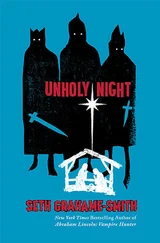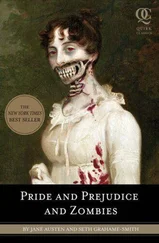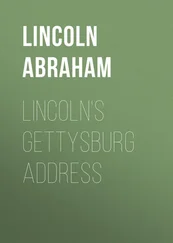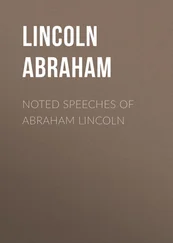There was even talk of vampires.
II
Sinking Springs Farm was about as far from New York City as one could get in early nineteenth-century America. Despite its name, the 300-acre “farm” was mostly heavily wooded land—and its rocky eastern Kentucky soil made the prospects of bumper crops unlikely at best. Thomas Lincoln, thirty-one years old, had acquired it for a $200 promissory note in the months before Abe was born. A carpenter by trade, Thomas hastily built a one-room cabin on his new land. It measured all of eighteen by twenty feet, with a hard dirt floor that was cold to the touch year-round. When it rained, water leaked through the roof in bucketfuls. When the wind howled, drafts forced their way through countless cracks in the walls. It was in these humble circumstances, on an unseasonably mild Sunday morning, that the sixteenth president of the United States came into the world. It’s said that he didn’t cry when he was born, but that he merely stared at his mother, quizzically, and then smiled at her.
Abe would have no memory of Sinking Springs. When he was two, a dispute arose over the deed to the land, so Thomas moved his family ten miles north, to the smaller, more fertile Knob Creek Farm. Despite the much-improved soil, Thomas—who could have made a comfortable living selling corn and grain to nearby settlers—plowed less than an acre of land.
He was an illiterate, indolent man who could not so much as sign his name until instructed by my mother. He had not a scrap of ambition in him… not the slightest interest in bettering his circumstances, or in providing for his family beyond the barest necessities. He never planted a single row more than was needed to keep our bellies from aching, or sought a single penny more than was needed to keep the simplest clothes on our backs.
It was an unduly harsh assessment, written by a forty-one-year-old Abe on the day of his father’s funeral (which he had chosen not to attend, and perhaps felt a pang of guilt over). While no one would ever accuse Thomas Lincoln of being “driven,” he seems to have been a reliable, if not bountiful, provider. That he never abandoned his family in times of desperate hardship and grief, or abandoned the frontier for the comforts of city life (as many of his contemporaries did), speaks to his character. And while he didn’t always understand or approve of his son’s pursuits, he always permitted them (eventually). However, Abe would never be able to forgive him for the tragedy that would transform both of their lives.
Typical of the times, Thomas Lincoln’s life had been one of continual struggle and frequent tragedy. Born in 1778, he moved from Virginia to Kentucky with his father, Abraham, and mother, Bathsheba, while still a child. When he was eight, Thomas saw his father murdered before his eyes. It was spring, and Abraham Sr. was busy clearing land to be planted, “when he was waylaid by a party of Shawnee savages.” Thomas watched, helpless, as his father was bludgeoned to death—his throat cut and scalp taken. What (if anything) provoked the attack, or why his own life was spared, he couldn’t say. Whatever the reasons, life was never the same for Thomas Lincoln. With no inheritance, he was left to wander from town to town, toiling in an endless series of odd jobs. He apprenticed with a carpenter, served as a prison guard, and rode flatboats on the Mississippi and Sangamon Rivers. He felled trees, plowed fields, and attended church when he could. There is no evidence that he ever set foot in a schoolhouse.
This wholly unremarkable life would have surely escaped the notice of history had Thomas not ventured into Elizabethtown one day when he was twenty-eight and, by chance, laid eyes on the young daughter of a Kentucky farmer. Their marriage, on June 12th, 1806, would change the shape of history in ways neither could have dreamed.
By all accounts, Nancy Hanks was a bright, gentle, and handsome woman who had a “remarkable” way with words (but seldom spoke among new acquaintances on account of painful shyness). She was literate, having enjoyed the formal education that her son never would. Nancy was a resourceful woman, and though books were hard to come by in the Kentucky wilderness, she always managed to have at least one borrowed or begged tome around for those rare moments when all the work of the day was done. Beginning when he was barely more than an infant, she would read Abe anything she could get her hands on: Voltaire’s Candide , Defoe’s Robinson Crusoe , the poetry of Keats and Byron. But it was the Bible that young Abraham loved above all others. The attentive toddler would sit on her lap, thrilling to the larger-than-life stories of the Old Testament: David and Goliath, Noah’s ark, the plagues of Egypt. He was especially fascinated by the tale of Job, the righteous man who had everything taken from him, every curse, sorrow, and betrayal leveled at him, yet continued to love and praise God. “He might have been a priest,” a childhood friend would write years later in an election pamphlet, “if life had been kinder to him.”
Knob Creek Farm was about as tough a place to live as one could find in the early 1800s. In the spring, frequent thunderstorms flooded the creek and turned crops into fields of waist-deep mud. In the winter, all color drained from the frozen landscape, and the trees became twisted fingers rattling against each other in the wind. It was here that Abe would experience many of his earliest memories: chasing his older sister, Sarah, through acres of blue ash and shagbark hickory; clinging to the back of a pony for a gentle summer ride; splitting kindling with a small ax beside his father. It was also here that he would experience the first of many devastating losses in his life.
When Abe was three, Nancy Lincoln gave birth to a boy christened Thomas, like his father. Sons were a double blessing to frontier families, and the elder Thomas no doubt looked to the day when he would have two able-bodied boys to share the work with. But those dreams were short-lived. The baby died just shy of a month old. Abe would write about it twenty years later, before he had lived to bury two of his own sons.
As for my own grief, I do not recall. I was perhaps too young to comprehend the meaning or irrevocability of it. However, I will never forget my mother and father’s torment. To describe it would be an exercise in futility. It is the sort of suffering that cannot be done justice with words. I can say only this—that I suspect it is an anguish from which one never recovers. A walking death.
It’s impossible to know what killed Thomas Lincoln Jr. The common causes ranged from dehydration, to pneumonia, to low birth weight. Congenital and chromosomal abnormalities were more than a century away from being understood or diagnosed. Even under the best conditions, the infant mortality rate was 10 percent in the early 1800s.
The elder Thomas built a small coffin and buried his son near the cabin. No grave marker remains. Nancy pulled herself together and doted on her remaining children—especially Abe. She encouraged his insatiable curiosity, his innate love of learning stories, names, and facts and reciting them again and again. Over her husband’s objections, she began to teach Abe how to read and write before his fifth birthday. “Father had no use for books,” he recalled years later, “short of burning them when the firewood got wet.” Though there is no record of her feelings, Nancy Lincoln must have sensed that her son was gifted. Certainly she was determined to see him go on to better things than she or her husband could.
The Old Cumberland Trail ran directly through Knob Creek Farm. It was a highway of sorts, the main route between Louisville and Nashville, and characters of every stripe passed in both directions daily. Five-year-old Abe would sit on a fence rail for hours at a time, laughing at the molasses wagon driver who always made a show of cursing his mules, or waving at the post rider as he galloped by on horseback. Occasionally he saw slaves being taken to auction.
Читать дальше












